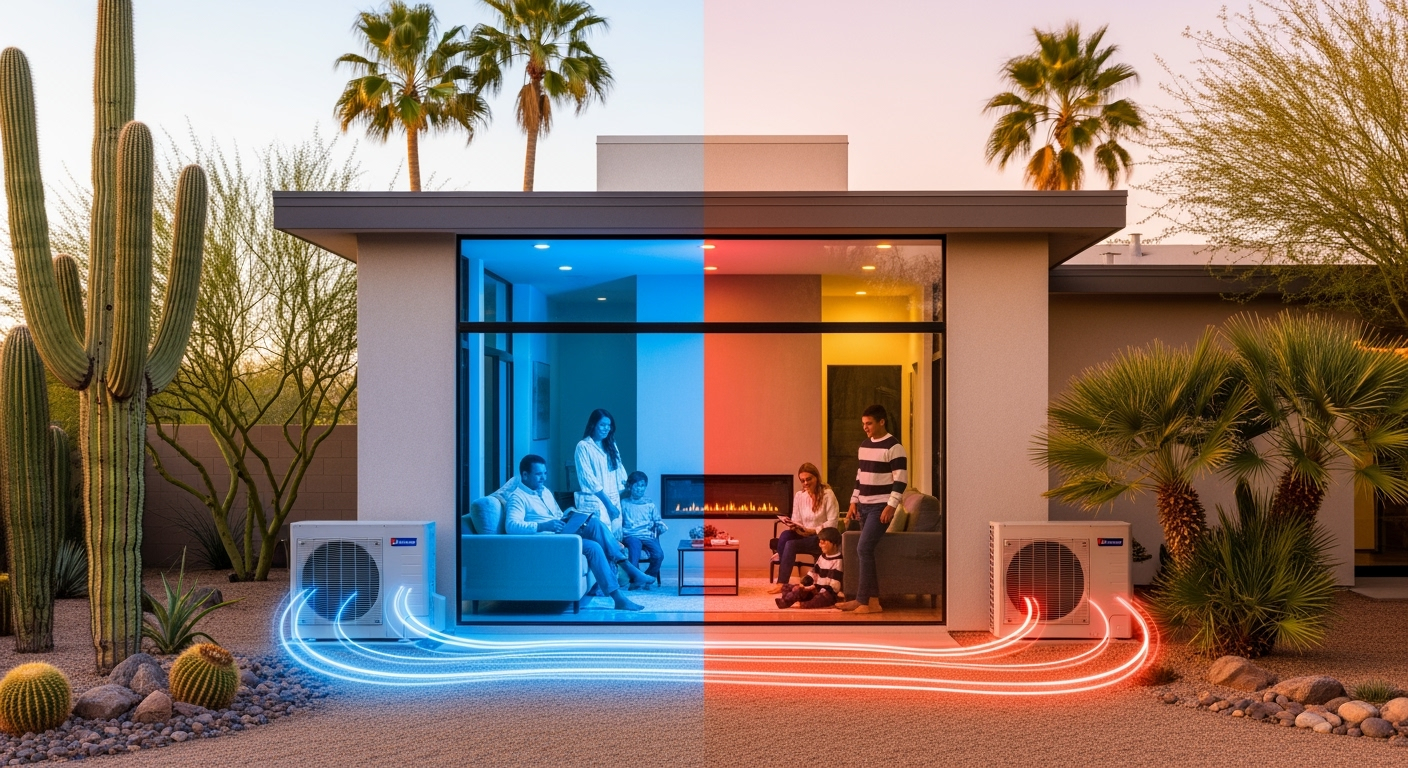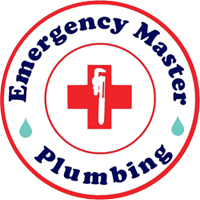

In the scorching heat of Phoenix, Arizona, where summer temperatures often soar above 100°F and winters can dip into chilly nights, maintaining a comfortable home environment is more than a luxury—it’s a necessity. Homeowners here face unique climate challenges, from relentless sun exposure that spikes cooling demands to occasional cold snaps that require efficient heating. This is where heat pumps shine as a versatile, energy-efficient solution. If you’re a Phoenix resident tired of high utility bills, inconsistent indoor temperatures, or outdated HVAC systems, understanding why heat pumps are increasingly popular can help you make informed decisions for your home.
As a trusted provider of plumbing and air services in the Phoenix area, we’ve seen firsthand how heat pumps transform homes into oases of comfort. In this comprehensive guide, we’ll explore the ins and outs of heat pumps, their benefits tailored to Phoenix’s desert climate, common problems they solve, and expert tips for installation and maintenance. By the end, you’ll see why so many locals are making the switch—and how it can solve your home comfort woes.
Understanding Heat Pumps: The Basics
Heat pumps are innovative HVAC systems that provide both heating and cooling by transferring heat rather than generating it. Unlike traditional furnaces or air conditioners that burn fuel or use electricity to create hot or cold air, heat pumps move existing heat from one place to another. In cooling mode, they extract heat from your home and release it outdoors. During heating mode, they pull heat from the outside air—even in cooler weather—and bring it inside.
For Phoenix homeowners, this technology is particularly appealing because it operates efficiently in mild winters. According to the U.S. Department of Energy, heat pumps can be up to 300% more efficient than conventional systems, meaning for every unit of electricity used, they can provide three units of heating or cooling. This efficiency is crucial in a city like Phoenix, where air conditioning accounts for a significant portion of household energy use.
If you’re new to heat pumps, consider them as a “reversible air conditioner.” They use refrigerant, a compressor, and coils to facilitate heat transfer. Ground-source (geothermal) heat pumps tap into the earth’s stable temperatures, while air-source models, which are more common in residential settings, draw from ambient air. In Phoenix’s arid environment, air-source heat pumps are often the go-to choice due to their affordability and adaptability.
The Phoenix Climate Challenge: Why Traditional Systems Fall Short
Phoenix’s climate is extreme, with over 100 days a year exceeding 100°F and low humidity that can make indoor air feel drier and more uncomfortable. Traditional air conditioning units work overtime during summers, leading to skyrocketing energy bills—sometimes exceeding $300 per month for average homes. In winter, while freezes are rare, nighttime lows in the 30s can leave homes feeling drafty if relying solely on inefficient electric heaters.
These challenges create real problems for homeowners: high operational costs, frequent breakdowns from overuse, and uneven temperature distribution. For instance, older central AC systems might cool one room effectively while leaving others stuffy, exacerbating discomfort during heatwaves. Additionally, Phoenix’s dust and pollen can clog filters, reducing system efficiency and indoor air quality.
Heat pumps address these issues head-on. By providing dual functionality, they eliminate the need for separate heating and cooling units, reducing maintenance hassles and space requirements. Their ability to dehumidify air also helps combat the dry desert air, preventing issues like dry skin or respiratory discomfort. Homeowners who’ve switched report up to 50% savings on energy bills, according to data from the Energy Star program, making them a practical solution for budget-conscious families in high-cost living areas like Phoenix.
How Heat Pumps Work in Phoenix’s Unique Environment
To truly appreciate heat pumps, let’s break down their operation in a Phoenix context. The system consists of an outdoor unit (compressor and coil) and an indoor unit (air handler). Refrigerant circulates between them, absorbing and releasing heat.
In summer, the heat pump acts like an AC: It absorbs indoor heat through the evaporator coil and expels it outside via the condenser. Phoenix’s high ambient temperatures might seem like a challenge, but modern heat pumps are designed with variable-speed compressors that adjust output, maintaining efficiency even at 115°F.
Come winter, the process reverses. The outdoor coil becomes the evaporator, extracting heat from the outside air (which retains some warmth even in cooler months) and transferring it indoors. Supplemental electric resistance heating kicks in only during rare extreme colds, ensuring reliability.
This adaptability solves a key problem: energy waste. In Phoenix, where cooling dominates but heating is occasionally needed, heat pumps avoid the inefficiency of running separate systems. For example, if your current setup involves a gas furnace for winter and an AC for summer, you’re likely paying for redundant maintenance and higher fuel costs. A heat pump consolidates this into one system, streamlining operations and reducing your carbon footprint—a growing concern for eco-conscious Phoenicians.
Benefits of Heat Pumps for Year-Round Comfort in Phoenix
The advantages of heat pumps extend beyond basic functionality, offering targeted solutions to Phoenix-specific issues.
Energy Efficiency and Cost Savings: With Phoenix’s average annual electricity rate around 12 cents per kWh, inefficient systems can drain wallets. Heat pumps boast a high Seasonal Energy Efficiency Ratio (SEER) and Heating Seasonal Performance Factor (HSPF), often exceeding 20 SEER for top models. This translates to lower bills—potentially saving $500+ annually for a 2,000 sq ft home.
Improved Indoor Air Quality: Dust storms and allergens are common in the Valley of the Sun. Heat pumps integrate with advanced filtration systems, capturing particles and improving air circulation. This is a game-changer for allergy sufferers, reducing reliance on standalone air purifiers.
Quiet Operation and Durability: Unlike noisy traditional units, heat pumps run quietly, enhancing home tranquility. Their robust design withstands Phoenix’s intense sun and occasional monsoons, with lifespans of 15-20 years when properly maintained.
Environmental Impact: As Arizona pushes for sustainable energy, heat pumps align with incentives like federal tax credits under the Inflation Reduction Act, which can offset installation costs by up to 30%.
Real-world example: A Phoenix family we assisted switched to a heat pump and reported not only cooler summers but also warmer winters without the dry heat from baseboard heaters, solving their discomfort and high bills in one fell swoop.
Common Heat Pump Problems and How to Solve Them
No system is perfect, and heat pumps can encounter issues, especially in Phoenix’s harsh conditions. Here’s a problem-solving guide based on our expertise:
Problem: Reduced Efficiency in Extreme Heat. Solution: Opt for models with high-temperature ratings and ensure regular coil cleaning to prevent dust buildup. Annual professional tune-ups can boost performance by 15-20%.
Problem: Frost Buildup in Winter. Though rare in Phoenix, defrost cycles can fail. Solution: Install units with automatic defrost features and check refrigerant levels routinely.
Problem: Noisy Operation or Vibrations. This often stems from loose parts or improper installation. Solution: Hire certified technicians for secure mounting and balance checks.
Problem: High Upfront Costs. Installation can range from $4,000-$8,000. Solution: Leverage rebates from APS or SRP utilities, which offer up to $1,000 for energy-efficient upgrades.
By addressing these proactively, homeowners avoid costly repairs and ensure longevity.
Installation and Maintenance Tips for Phoenix Residents
Proper installation is key to reaping heat pump benefits. In Phoenix, factors like home size, insulation, and sun exposure must be considered. A professional assessment ensures the right sizing—too small, and it overworks; too large, and it short-cycles, reducing efficiency.
Maintenance involves biannual inspections: cleaning filters, checking refrigerant, and inspecting ducts. Phoenix’s dust means more frequent filter changes—every 1-3 months. DIY tips include keeping the outdoor unit clear of debris and monitoring thermostat settings for optimal performance (around 78°F in summer).
For new installations, integrate smart thermostats for remote control, solving the problem of forgetting to adjust settings during vacations.
Comparing Heat Pumps to Traditional HVAC Systems
Traditional systems like gas furnaces and central ACs are reliable but inefficient for Phoenix. Furnaces burn fuel, contributing to higher emissions and costs, while ACs lack heating capabilities. Heat pumps outperform in efficiency, with lower operating costs (e.g., $0.50 per hour vs. $1.00 for electric heaters).
In a side-by-side comparison, a heat pump might cost more initially but pays off in 3-5 years through savings. For Phoenix’s variable climate, their all-in-one design is unbeatable.
Why Expertise Matters: Choosing the Right Professionals
Installing or maintaining a heat pump requires specialized knowledge to avoid common pitfalls like refrigerant leaks or electrical issues. Look for NATE-certified technicians who understand local codes and climate nuances.
In conclusion, heat pumps offer Phoenix homeowners a reliable path to year-round comfort, solving energy inefficiencies, comfort inconsistencies, and high costs in our desert paradise. If you’re ready to upgrade, we recommend contacting Emergency Master Plumbing & Air. With our experienced team serving the Phoenix area, we provide expert heat pump installations, repairs, and maintenance tailored to your needs. Call us today at 623-584-4706 for a free consultation and discover how we can make your home more comfortable and efficient.
